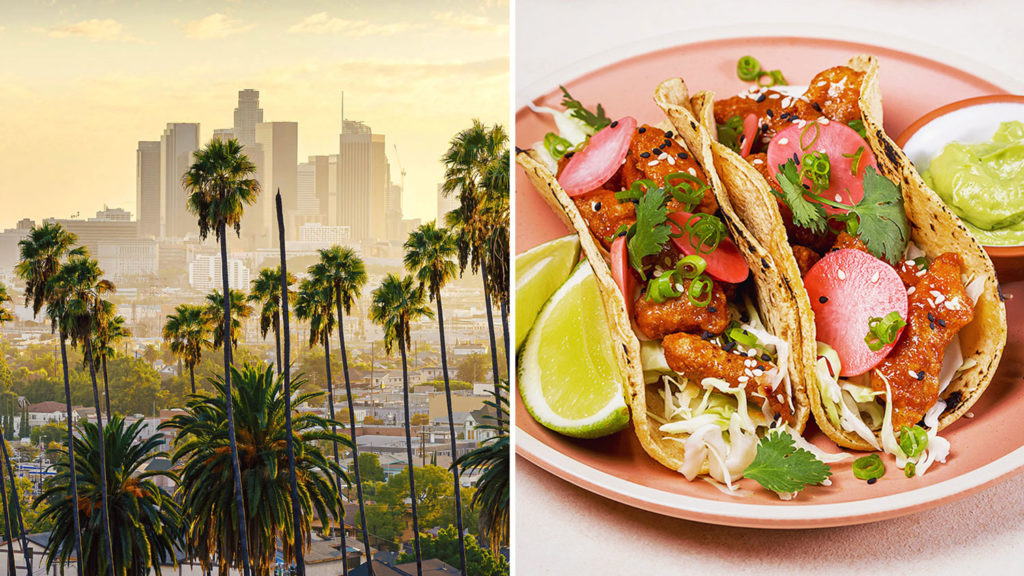The intersection of Korean-American and Mexican-American street food occurred in the fall of 2008, next to the curb outside of an L.A. club, where chef Roy Choi’s Kogi Taqueria truck first began to sell its original fusion, the Korean taco. The concept of spooning Korean barbecue onto corn tortillas, dressed with the fiery flavors of taco truck salsa bars was dreamed up by Kogi partner Mark Maguera, executed by chef Choi, and broadcast via Twitter to Los Angeles, and then the world, as a modern food truck revolution swept over the planet. A year before, in Koreatown, the heart of L.A.’s substantial Korean community where the flavors of Kogi Taqueria had been marinating, Kyochon, the first Korean Fried Chicken chain, arrived from Seoul. Although fried chicken on a taco wasn’t new, the KFC taco was inevitable. And so, too, was the eventual vegan Korean fried chicken taco, a modern twist on a now-famous Southern California classic.
In the 60s, a late-night mom-and-pop restaurant in Tijuana’s red light district, Kentucky Fried Buches, opened with just one item on the menu: fried chicken necks. For over 50 years, KFB delighted hungry diners looking for a tasty after-hours snack of crispy skin with a little chicken meat attached on a corn tortilla, dressed with a spicy red salsa, which inspired a couple of L.A.-based food trucks, namely, the Santa Rita, Jalisco truck.
In recent years, a young Latino chef, Jonathan Pérez of Macheen gained a following for his spicy fried chicken tacos, topped with a piquant buttermilk fried chicken dusted with a proprietary blend of ground chile peppers, and slathered in a guajillo chile ranch dressing. While not influenced by these rare fried chicken tacos in Mexican culture, Koreatown’s Michindak, or Crazy Chicken, has added another chapter in L.A.’s evolving Mexican Korean street food mashup. “Charlie, my ex-marketing manager, came up with the idea in 2019, and he had so much love, fascination, and passion for L.A. street truck food, tacos and burritos,” said Joseph Park of Michindak. Park attributes the rise in the popularity of Korean Fried Chicken in all its forms to the year 2019, when K-Pop, Korean dramas, and young Korean YouTubers spread Korean culture to a wider audience.
Food trucks in L.A. helped create fusion cuisine
It’s no coincidence that the food truck scene begun by Kogi in 2008 was heavily influenced by Mexican-American street food, with many trucks adding tacos as a menu item—Argentine tacos, Thai tacos, and several trucks that followed Kogi, doing Korean tacos. The intermingled flavors of Latin America and Asia in our restaurants inspired by ramen franchises from Tokyo, CDMX-style al pastor specialists, and dim sum houses, are the culinary DNA of such hybrids, like the KFC taco, that is a tale of Los Angeles cuisine, on a corn tortilla.
Located in an outdoor kiosk on the corner of West 6th and South Catalina, inside one of Koreatown’s numerous strip malls jam-packed with specialty and regional Korean eateries, is Michindak. Their Korean fried chicken kiosk serves KFC with 5 levels of spice, from original to the ultra spicy Michin in a piece combo, in fried chicken sandwiches, capitalizing on L.A.’s obsession over hot chicken sandwiches, and their big chicken tacos. Chicken strips in a spicy batter are double-fried, Korean-style (also a technique used in Baja-style fish tacos), coated with honey orange sauce, and dusted with Hidden Valley Ranch powder. They are wrapped in corn tortillas with slaw, pickles, and a habanero sauce. Your very spicy taco is cooled by dipping it in Ranch dressing, yet another L.A. trend, that of dipping tacos is part of the dish.
From the age of alfalfa sprouts, vegan Indian food, the Self-Realization Cafe, and H.E.L.P. in the 60s, to plant-based meats, to the popularity of the vegan traditions in Thai and Vietnamese cuisines in the 90s, L.A. has led the way in vegan culture. While avocado toast was, for a moment, its symbol, the region’s vegan roots run much deeper. The first plant-based restaurant, aptly named, The Vegetarian Restaurant, opened on 3rd Street in the 1890s. Today, plant-based meat dishes and vegan substitutes are everywhere from cafes to five-star restaurants, even on Mexican taco trucks, and in the foodie web of Koreatown.
“In Korea, KFC is more serious, I mean, there are Michelin-starred chefs that have gone into perfecting the dish, which is everywhere in Korea, but here, things like chicken sandwiches, and tacos are very California,” said Matt Kang, Korean-American editor of Eater LA. And in California that includes vegan versions of our favorite dishes such as Jesse Boy’s Korean fried cauliflower, or the V-KBBQ tacos at Tacos Tu Madre in Westwood, or vegan menu items on taquerias sprawling from the San Fernando Valley to Long Beach.
Whatever your fusion favorite, the only way to wrap a taco in classic Angeleno style is with fresh-made corn tortillas. L.A. is known for the best corn tortillas in the country with several producers selling ones made with nixtamal, using organic corn. It’s the perfect wrapper for a spicy plant-based KFC taco tossed in a flavorful gochujang sauce— a uniquely and healthy L.A. mix of Korean and Mexican street food made vegan.
How to make a vegan KFC taco
Try your own vegan Korean fried chicken taco at home with this recipe created by celebrity chef Nyesha Arrington using LikeMeat Chicken.


